【CISG】United Nations Convention on Contracts for the International
联合国国际货物销售合同公约英文

联合国国际货物销售合同公约英文
联合国国际货物销售合同公约英文,全称为“United Nations Convention on Contracts for the International Sale of Goods”,简称为CISG。
该公约是联合国于1980年通过的一项国际公约,主要目的是为了规范国际货物销售合同的制定和履行,促进国际贸易的发展。
CISG适用于各种形式的货物销售合同,涉及到国际贸易的双方必须遵守该公约的规定。
该公约规定了合同的基本要素、合同的履行、合同的违约责任以及解决争议的方式等内容,为国际贸易提供了法律保障。
CISG已经得到了全球范围内的广泛认可和应用,目前已有约90个国家加入了该公约。
对于从事国际贸易的企业和个人来说,了解和遵守CISG的规定,对于保护自身权益、提高国际贸易效率和降低风险都具有重要的意义。
- 1 -。
联合国国际货物销售合同公约

联合国国际货物销售合同公约联合国国际货物销售合同公约,简称为CISG(United Nations Convention on Contracts for the International Sale of Goods),是联合国设立的一个国际法基准。
它于1980年4月11日在维也纳通过,自1988年1月1日起正式生效。
该公约的目的是在国际货物销售中统一和协调国际交易,促进国际贸易的发展和繁荣。
该公约适用于国际货物销售的契约,适用于买卖双方居于合同国的情况下。
许多国家都成为了该公约的缔约国,目前已有近90个国家加入。
CISG的核心原则是平等原则和将合同约定的货物销售规则转化为法律条文。
它主要包括了买卖双方的义务和权利,货物的交付和接受,价格、付款和违约责任等方面的规定。
根据该公约,买卖双方应当履行他们在合同中约定的责任和义务。
双方应当以善意和合理的方式完成交易,包括以合适的方法传递货物,支付合理的价格,履行相关手续等。
此外,该公约还规定了对质量缺陷的补救措施,包括退货、修理、降价和赔偿等。
合同的成立和变更,以及解释和补充合同条款的规定也在该公约中有所提及。
在合同成立阶段,买卖双方通过口头、书面或其他方式达成的一致意见即构成有效合同。
合同的变更和解释应当依据合同的原则和买卖双方的意愿进行。
双方还可以通过合理的方式补充合同条款。
CISG还涉及到关于货物的交付和接受的规定。
根据该公约,卖方应当交付符合合同要求的货物,并将货物的所有权转移给买方。
买方应当及时接受货物,并支付合理的价款。
如果卖方未能交付合格的货物,买方有权要求修复、退货或索赔。
对于违约行为,该公约也作了规定。
违反合同条款的一方应当承担相应的违约责任,包括支付损失赔偿、支付延迟付款的利息等。
然而,买卖双方也可以通过协商解决争议,而不一定要采取法律诉讼。
总之,联合国国际货物销售合同公约是国际货物销售领域的一个重要法律规范。
它规定了买卖双方的义务和权利,货物的交付和接受,价格、付款和违约责任等方面的规定。
CISG联合国国际货物销售合同公约中英文对照
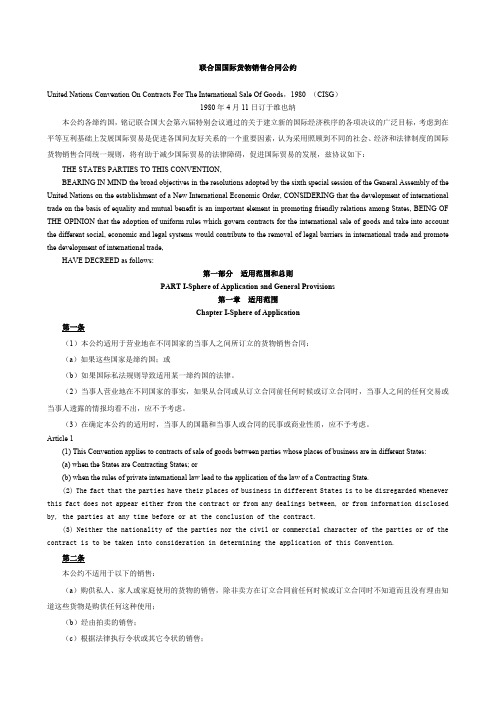
联合国国际货物销售合同公约United Nations Convention On Contracts For The International Sale Of Goods,1980 (CISG)1980年4月11日订于维也纳本公约各缔约国,铭记联合国大会第六届特别会议通过的关于建立新的国际经济秩序的各项决议的广泛目标,考虑到在平等互利基础上发展国际贸易是促进各国间友好关系的一个重要因素,认为采用照顾到不同的社会、经济和法律制度的国际货物销售合同统一规则,将有助于减少国际贸易的法律障碍,促进国际贸易的发展,兹协议如下:THE STATES PARTIES TO THIS CONVENTION,BEARING IN MIND the broad objectives in the resolutions adopted by the sixth special session of the General Assembly of the United Nations on the establishment of a New International Economic Order, CONSIDERING that the development of international trade on the basis of equality and mutual benefit is an important element in promoting friendly relations among States, BEING OF THE OPINION that the adoption of uniform rules which govern contracts for the international sale of goods and take into account the different social, economic and legal systems would contribute to the removal of legal barriers in international trade and promote the development of international trade,HAVE DECREED as follows:第一部分适用范围和总则PART I-Sphere of Application and General Provisions第一章适用范围Chapter I-Sphere of Application第一条(1)本公约适用于营业地在不同国家的当事人之间所订立的货物销售合同:(a)如果这些国家是缔约国;或(b)如果国际私法规则导致适用某一缔约国的法律。
CISG联合国国际货物销售合同公约中英文对照

联合国国际货物销售合同公约United Nations Convention On Contracts For The International Sale Of Goods,1980 (CISG)1980年4月11日订于维也纳本公约各缔约国,铭记联合国大会第六届特别会议通过的关于建立新的国际经济秩序的各项决议的广泛目标,考虑到在平等互利基础上发展国际贸易是促进各国间友好关系的一个重要因素,认为采用照顾到不同的社会、经济和法律制度的国际货物销售合同统一规则,将有助于减少国际贸易的法律障碍,促进国际贸易的发展,兹协议如下:THE STATES PARTIES TO THIS CONVENTION,BEARING IN MIND the broad objectives in the resolutions adopted by the sixth special session of the General Assembly of the United Nations on the establishment of a New International Economic Order, CONSIDERING that the development of international trade on the basis of equality and mutual benefit is an important element in promoting friendly relations among States, BEING OF THE OPINION that the adoption of uniform rules which govern contracts for the international sale of goods and take into account the different social, economic and legal systems would contribute to the removal of legal barriers in international trade and promote the development of international trade,HAVE DECREED as follows:第一部分适用范围和总则PART I-Sphere of Application and General Provisions第一章适用范围Chapter I-Sphere of Application第一条(1)本公约适用于营业地在不同国家的当事人之间所订立的货物销售合同:(a)如果这些国家是缔约国;或(b)如果国际私法规则导致适用某一缔约国的法律。
【精品】3国际商法CISG

三、不适用CISG的买卖范围(1)
(公约第2条)公约不适用于以下的销售: (a)购买供私人、家人或家庭使用的货物买卖。购供私人、家人或家庭使用的货物属消费品买卖,一般由内国的消费者保护法来保护。例外:如果卖方在订立合同前任何时候或订立合同时不知道而且没有理由知道这些货物是购供任何这种使用的,则公约仍然可能适用。
(b)以拍卖方式进行的买卖(c)根据法律执行令状或其他令状的买卖这两种成交方式与一般的买卖不同,应受各国专门性或强制性法律支配。但商品交易所的销售不在这一排除范围,它们只是构成订立合同的一种特殊方式。
(d)公债、股票、投资证券、流通票据或货币的买卖(e)船舶、船只、气垫船或飞机的买卖(f)电力的买卖将公债、投资证券和流通票据的销售排除在外是为了避免同国内法的强制性规则相冲突。但单据销售不在排除之列。对船舶、船只、飞机和hnologies Inc v PMC-Sierra Inc (CISG-online 616)
买方Asante Technologies Inc的主营业地在加利福尼亚,买方从卖方PMC-Sierra Inc在加利福尼亚的经销商那买ASICs集成电路。卖方在特拉华州成立,同时在加州也有机构,但是,卖方的主要行政、企划和管理部门都设在加拿大BC省的伯纳比,同时买方也是向卖方在伯纳比的部门订购,货物也是在那里交付。卖方在加州的机构则给买方出具了发票。加州法院认定合同的主要联系点位于卖方在加拿大的部门,而卖方在加州的机构与合同的联系则不那么重要,因此根据公约第10条(a)款,公约适用。因为双方的营业地在不同国家。
(3)产品责任不受公约管辖。(公约不适用于卖方对于货物对任何人所造成的死亡或伤害的责任。公约第5条)但这并未排除买方据公约向卖方提出补偿的主张。这种补偿是基于买方对人身受损害或死亡的第三方即真正的买家的责任引起的。因为买方所受到的损失实际上是金钱上的损失,因而仍然可根据公约向卖方提出违约责任的救济。第5 条也没有排除因货物不符合同而对财产造成损害的主张。(4)当事人的行为能力、欺诈和胁迫等问题。
联合国国际货物销售合同公约(中英文对照)
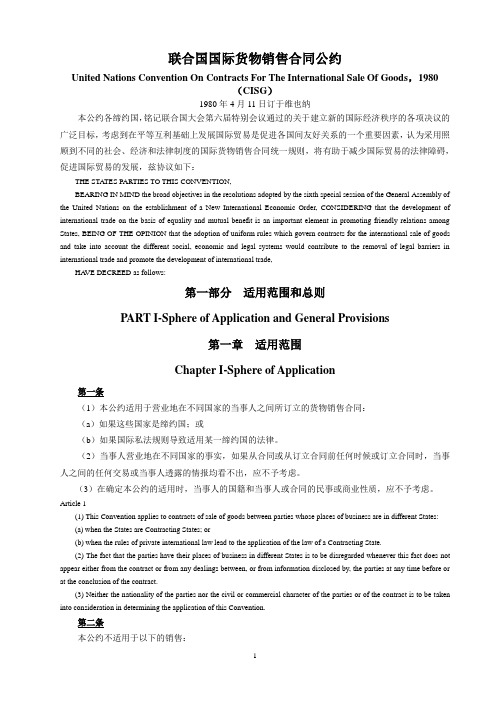
联合国国际货物销售合同公约United Nations Convention On Contracts For The International Sale Of Goods,1980(CISG)1980年4月11日订于维也纳本公约各缔约国,铭记联合国大会第六届特别会议通过的关于建立新的国际经济秩序的各项决议的广泛目标,考虑到在平等互利基础上发展国际贸易是促进各国间友好关系的一个重要因素,认为采用照顾到不同的社会、经济和法律制度的国际货物销售合同统一规则,将有助于减少国际贸易的法律障碍,促进国际贸易的发展,兹协议如下:THE STATES PARTIES TO THIS CONVENTION,BEARING IN MIND the broad objectives in the resolutions adopted by the sixth special session of the General Assembly of the United Nations on the establishment of a New International Economic Order, CONSIDERING that the development of international trade on the basis of equality and mutual benefit is an important element in promoting friendly relations among States, BEING OF THE OPINION that the adoption of uniform rules which govern contracts for the international sale of goods and take into account the different social, economic and legal systems would contribute to the removal of legal barriers in international trade and promote the development of international trade,HA VE DECREED as follows:第一部分适用范围和总则PART I-Sphere of Application and General Provisions第一章适用范围Chapter I-Sphere of Application第一条(1)本公约适用于营业地在不同国家的当事人之间所订立的货物销售合同:(a)如果这些国家是缔约国;或(b)如果国际私法规则导致适用某一缔约国的法律。
联合国国际货物买卖合同公约(CISG).

目录联合国国际货物销售合同公约(CISG)United Nations Convention on Contracts for the International Sale of Goods (1980)[CISG]第一部分适用范围和总则Part I Sphere of Application and General Provisions第一章适用范围Chapter I Sphere of Application第二章总则Chapter II General Provisions第二部分合同的订立PART II Formation of the Contract第三部分货物销售PART III Sale of Goods第一章总则Chapter I General Provisions第二章卖方的义务Chapter II Obligations of the Seller第一节交付货物和移交单据Section I. Delivery of the goods and handing over of documents第二节货物相符与第三方要求Section II. Conformity of the goods and third party claims第三节卖方违反合同的补救办法Section III. Remedies for breach of contract by the seller第三章买方的义务Chapter III Obligations of the Buyer第一节支付价款Section I. Payment of the price第二节收取货物Section II. Taking delivery第三节买方违反合同的补救办法Section III. Remedies for breach of contract by the buyer第四章风险移转Chapter IV Passing of Risk第五章卖方和买方义务的一般规定Chapter V Provisions Common to the Obligations of the Seller and ofthe Buyer第一节预期违反合同和分批交货合同Section I. Anticipatory breach and installment contracts第二节损害赔偿Section II. Damages第三节利息Section III. Interest第四节免责Section IV. Exemptions第五节宣告合同无效的效果Section V. Effects of avoidance第六节保全货物Section VI. Preservation of the goods第四部分最后条款PART IV Final Provision联合国国际货物销售合同公约(CISG)United Nations Convention on Contracts for the International Sale ofGoods(1980) [CISG](1980年4月11日订于维也纳)本公约各缔约国,铭记联合国大会第六届特别会议通过的关于建立新的国际经济秩序的各项决议的广泛目标,考虑到在平等互利基础上发展国际贸易是促进各国间友好关系的一个重要因素,认为采用照顾到不同的社会、经济和法律制度的国际货物销售合同统一规则,将有助于减少国际贸易的法律障碍,促进国际贸易的发展,兹协议如下:THE STATES PARTIES TO THIS CONVENTION,BEARING IN MIND the broad objectives in the resolutions adopted by the sixth special session of the General Assembly of the United Nations on the establishment of a New International Economic Order,CONSIDERING that the development of international trade on the basis of equality and mutual benefit is an important element in promoting friendly relations among States, BEING OF THE OPINION that the adoption of uniform rules which govern contracts for the international sale of goods and take into account the different social, economic and legal systems would contribute to the removal of legal barriers in international trade and promote the development of international trade,HAVE AGREED as follows:第一部分适用范围和总则Part I Sphere of Application and General Provisions第一章适用范围Chapter I Sphere of Application第一条Article 1(1)本公约适用于营业地在不同国家的当事人之间所订立的货物销售合同:(1) This Convention applies to contracts of sale of goods between parties whose places of business are in different States:(a)如果这些国家是缔约国;或(a) when the States are Contracting States; or(b)如果国际私法规则导致适用某一缔约国的法律。
《联合国国际货物销售合同公约》(CISG)的缔约国最新情况及各国的保留

《联合国国际货物销售合同公约》(CISG)的缔约国最新情况及各国的保留《联合国国际货物销售合同公约》(United Nations Convention on Contracts for the International Sale of Goods)简称“CISG”是迄今为⽌最成功的国际贸易领域实体法统⼀⽴法。
该公约于1980年通过,以阿拉伯⽂、中⽂、英⽂、法⽂、俄⽂和西班⽛⽂书写,各⽂本具有同等效⼒。
1988年1⽉1⽇该公约正式⽣效。
公约的成员国⾄今(2020年12⽉24⽇),该公约共有96个成员国,分别是:中国、美国、⽇本、意⼤利、德国、希腊、法国、澳⼤利亚、俄罗斯、巴西、加拿⼤、埃及、以⾊列、匈⽛利、荷兰、新西兰、波兰、新加坡、西班⽛、⼟⽿其、越南、丹麦、挪威、葡萄⽛、⽩俄罗斯、捷克共和国、芬兰、奥地利、哥伦⽐亚、⽐利时、智利、伊拉克、墨西哥、⼤韩民国、朝鲜民主主义⼈民共和国、阿根廷、瑞典、罗马尼亚、蒙古、乌克兰、瑞⼠、⽼挝、斯洛伐克、阿尔巴尼亚、亚美尼亚、阿塞拜疆、巴林、贝宁、波斯尼亚和⿊塞哥维那、保加利亚、布隆迪、喀麦隆、刚果、哥斯达黎加、克罗地亚、古巴、塞浦路斯、多⽶尼加共和国、厄⽠多尔、萨尔⽡多、爱沙尼亚、斐济、加蓬、佐治亚州、加纳、危地马拉、⼏内亚、圭亚那、洪都拉斯、冰岛、吉尔吉斯斯坦、拉脱维亚、黎巴嫩、莱索托、利⽐⾥亚、列⽀敦⼠登、⽴陶宛、卢森堡、马达加斯加、⽑⾥塔尼亚、⿊⼭、北马其顿、巴拉圭、秘鲁、摩尔多⽡共和国、圣马⼒诺、塞尔维亚、斯洛⽂尼亚、圣⽂森特和格林纳丁斯、巴勒斯坦国、阿拉伯叙利亚共和国、乌⼲达、乌拉圭、乌兹别克斯坦、委内瑞拉玻利⽡尔共和国、赞⽐亚。
其中危地马拉(Guatemala)是加⼊CISG时间最短的缔约国,其于2019年12⽉11⽇交存加⼊书,CISG于12个⽉后第⼀个⽉的第⼀⽇对其⽣效;即CISG将于2021年1⽉1⽇期起对其⽣效。
公约的保留条款为了尽可能多的扩⼤公约的接受程度,公约就相关事项规定了保留。
cisg公约 准据法
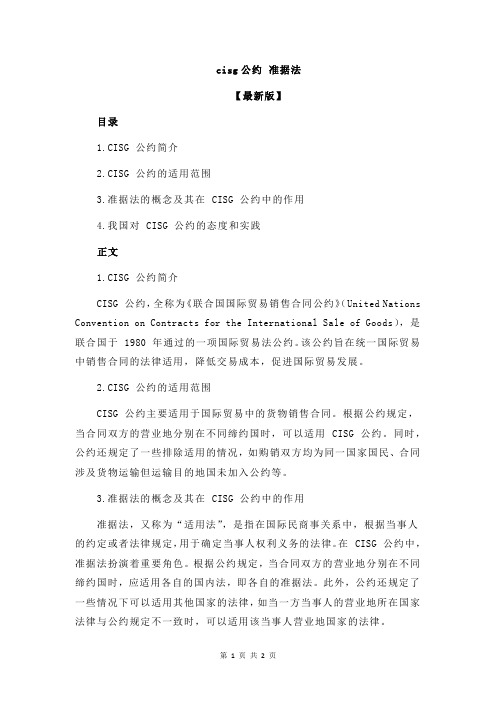
cisg公约准据法【最新版】目录1.CISG 公约简介2.CISG 公约的适用范围3.准据法的概念及其在 CISG 公约中的作用4.我国对 CISG 公约的态度和实践正文1.CISG 公约简介CISG 公约,全称为《联合国国际贸易销售合同公约》(United Nations Convention on Contracts for the International Sale of Goods),是联合国于 1980 年通过的一项国际贸易法公约。
该公约旨在统一国际贸易中销售合同的法律适用,降低交易成本,促进国际贸易发展。
2.CISG 公约的适用范围CISG 公约主要适用于国际贸易中的货物销售合同。
根据公约规定,当合同双方的营业地分别在不同缔约国时,可以适用 CISG 公约。
同时,公约还规定了一些排除适用的情况,如购销双方均为同一国家国民、合同涉及货物运输但运输目的地国未加入公约等。
3.准据法的概念及其在 CISG 公约中的作用准据法,又称为“适用法”,是指在国际民商事关系中,根据当事人的约定或者法律规定,用于确定当事人权利义务的法律。
在 CISG 公约中,准据法扮演着重要角色。
根据公约规定,当合同双方的营业地分别在不同缔约国时,应适用各自的国内法,即各自的准据法。
此外,公约还规定了一些情况下可以适用其他国家的法律,如当一方当事人的营业地所在国家法律与公约规定不一致时,可以适用该当事人营业地国家的法律。
4.我国对 CISG 公约的态度和实践我国于 1986 年加入 CISG 公约,并对公约进行了研究和实践。
在实际操作中,我国充分尊重公约的规定,通过司法解释和实践,逐步完善与国际贸易相关的法律制度。
同时,我国还积极参与国际贸易法领域的国际合作,推动国际贸易法的发展和完善。
总之,CISG 公约作为国际贸易法领域的一项重要公约,对于统一国际贸易中销售合同的法律适用具有重要意义。
联合国国际货物销售合同公约UnitedNationsConventiononContractsfor
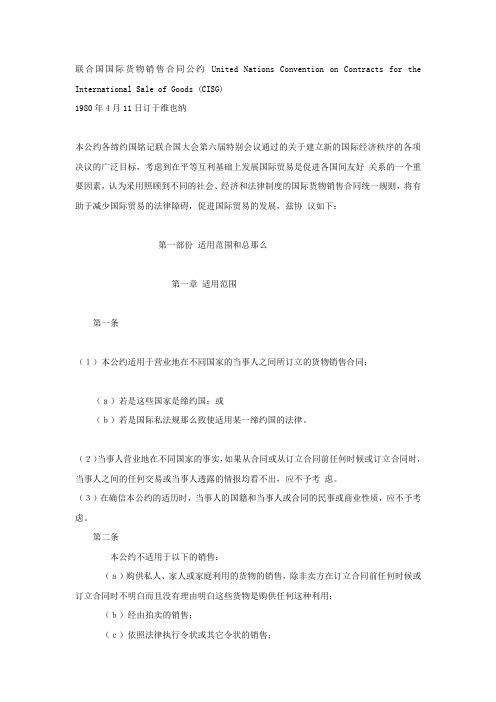
联合国国际货物销售合同公约United Nations Convention on Contracts for the International Sale of Goods (CISG)1980年4月11日订于维也纳本公约各缔约国铭记联合国大会第六届特别会议通过的关于建立新的国际经济秩序的各项决议的广泛目标,考虑到在平等互利基础上发展国际贸易是促进各国间友好关系的一个重要因素,认为采用照顾到不同的社会、经济和法律制度的国际货物销售合同统一规则,将有助于减少国际贸易的法律障碍,促进国际贸易的发展,兹协议如下:第一部份适用范围和总那么第一章适用范围第一条(1)本公约适用于营业地在不同国家的当事人之间所订立的货物销售合同:(a)若是这些国家是缔约国;或(b)若是国际私法规那么致使适用某一缔约国的法律。
(2)当事人营业地在不同国家的事实,如果从合同或从订立合同前任何时候或订立合同时,当事人之间的任何交易或当事人透露的情报均看不出,应不予考虑。
(3)在确信本公约的适历时,当事人的国籍和当事人或合同的民事或商业性质,应不予考虑。
第二条本公约不适用于以下的销售:(a)购供私人、家人或家庭利用的货物的销售,除非卖方在订立合同前任何时候或订立合同时不明白而且没有理由明白这些货物是购供任何这种利用;(b)经由拍卖的销售;(c)依照法律执行令状或其它令状的销售;(d)公债、股票、投资证券、流通单据或货币的销售;(e)船舶、船只、气垫船或飞机的销售;(f)电力的销售。
第三条(1)供应尚待制造或生产的货物的合同应视为销售合同,除非订购货物的当事人保证供应这种制造或生产所需的大部分重要材料。
(2)本公约不适用于供给货物一方的绝大部份义务在于供给劳力或其它效劳的合同。
第四条本公约只适用于销售合同的订立和卖方和买方因此种合同而产生的权利和义务。
特别是,本公约除非另有明文规定,与以下事项无关:(a)合同的效劳,或其任何条款的效劳,或任何老例的效劳;(b)合同对所售货物所有权可能产生的阻碍.第五条本公约不适用于卖方关于货物对任何人所造成的死亡或损害的责任。
联合国国际货物销售合同公约(中英文对照)

联合国国际货物销售合同公约United Nations Convention On Contracts For The International Sale Of Goods,1980(CISG)1980年4月11日订于维也纳本公约各缔约国,铭记联合国大会第六届特别会议通过的关于建立新的国际经济秩序的各项决议的广泛目标,考虑到在平等互利基础上发展国际贸易是促进各国间友好关系的一个重要因素,认为采用照顾到不同的社会、经济和法律制度的国际货物销售合同统一规则,将有助于减少国际贸易的法律障碍,促进国际贸易的发展,兹协议如下:THE STATES PARTIES TO THIS CONVENTION,BEARING IN MIND the broad objectives in the resolutions adopted by the sixth special session of the General Assembly of the United Nations on the establishment of a New International Economic Order, CONSIDERING that the development of international trade on the basis of equality and mutual benefit is an important element in promoting friendly relations among States, BEING OF THE OPINION that the adoption of uniform rules which govern contracts for the international sale of goods and take into account the different social, economic and legal systems would contribute to the removal of legal barriers in international trade and promote the development of international trade,HA VE DECREED as follows:第一部分适用范围和总则PART I-Sphere of Application and General Provisions第一章适用范围Chapter I-Sphere of Application第一条(1)本公约适用于营业地在不同国家的当事人之间所订立的货物销售合同:(a)如果这些国家是缔约国;或(b)如果国际私法规则导致适用某一缔约国的法律。
联合国国际货物销售合同公约CISG中文版
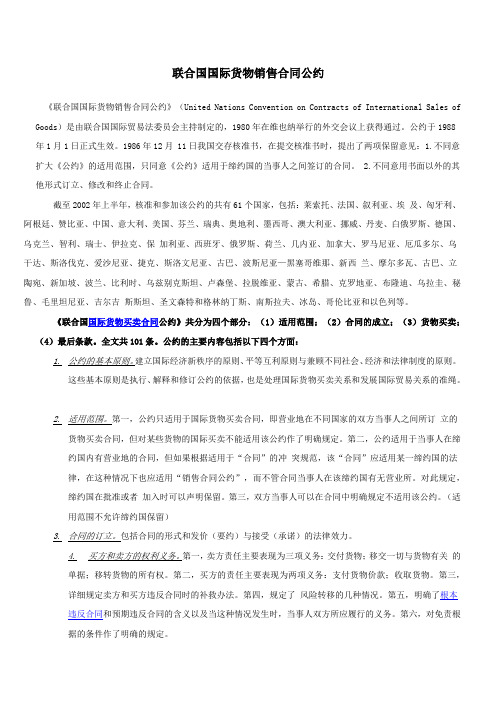
联合国国际货物销售合同公约《联合国国际货物销售合同公约》(United Nations Convention on Contracts of International Sales of Goods)是由联合国国际贸易法委员会主持制定的,1980年在维也纳举行的外交会议上获得通过。
公约于1988年1月1日正式生效。
1986年12月 11日我国交存核准书,在提交核准书时,提出了两项保留意见:1.不同意扩大《公约》的适用范围,只同意《公约》适用于缔约国的当事人之间签订的合同。
2.不同意用书面以外的其他形式订立、修改和终止合同。
截至2002年上半年,核准和参加该公约的共有61个国家,包括:莱索托、法国、叙利亚、埃及、匈牙利、阿根廷、赞比亚、中国、意大利、美国、芬兰、瑞典、奥地利、墨西哥、澳大利亚、挪威、丹麦、白俄罗斯、德国、乌克兰、智利、瑞士、伊拉克、保加利亚、西班牙、俄罗斯、荷兰、几内亚、加拿大、罗马尼亚、厄瓜多尔、乌干达、斯洛伐克、爱沙尼亚、捷克、斯洛文尼亚、古巴、波斯尼亚—黑塞哥维那、新西兰、摩尔多瓦、古巴、立陶宛、新加坡、波兰、比利时、乌兹别克斯坦、卢森堡、拉脱维亚、蒙古、希腊、克罗地亚、布隆迪、乌拉圭、秘鲁、毛里坦尼亚、吉尔吉斯斯坦、圣文森特和格林纳丁斯、南斯拉夫、冰岛、哥伦比亚和以色列等。
《联合国国际货物买卖合同公约》共分为四个部分:(1)适用范围;(2)合同的成立;(3)货物买卖;(4)最后条款。
全文共101条。
公约的主要内容包括以下四个方面:1.公约的基本原则。
建立国际经济新秩序的原则、平等互利原则与兼顾不同社会、经济和法律制度的原则。
这些基本原则是执行、解释和修订公约的依据,也是处理国际货物买卖关系和发展国际贸易关系的准绳。
2.适用范围。
第一,公约只适用于国际货物买卖合同,即营业地在不同国家的双方当事人之间所订立的货物买卖合同,但对某些货物的国际买卖不能适用该公约作了明确规定。
第二,公约适用于当事人在缔约国内有营业地的合同,但如果根据适用于“合同”的冲突规范,该“合同”应适用某一缔约国的法律,在这种情况下也应适用“销售合同公约”,而不管合同当事人在该缔约国有无营业所。
【法学】联合国货物贸易合同公约cisg(中英文版)共22页
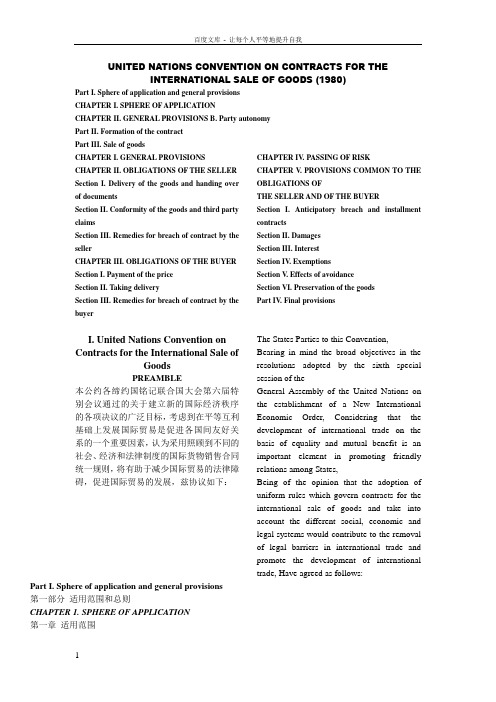
UNITED NATIONS CONVENTION ON CONTRACTS FOR THE INTERNATIONAL SALE OF GOODS (1980)Part I. Sphere of application and general provisionsCHAPTER I. SPHERE OF APPLICATIONCHAPTER II. GENERAL PROVISIONS B. Party autonomyPart II. Formation of the contractPart III. Sale of goodsCHAPTER I. GENERAL PROVISIONS CHAPTER II. OBLIGATIONS OF THE SELLER Section I. Delivery of the goods and handing over of documentsSection II. Conformity of the goods and third party claimsSection III. Remedies for breach of contract by the sellerCHAPTER III. OBLIGATIONS OF THE BUYER Section I. Payment of the priceSection II. Taking deliverySection III. Remedies for breach of contract by the buyer CHAPTER IV. PASSING OF RISKCHAPTER V. PROVISIONS COMMON TO THE OBLIGATIONS OFTHE SELLER AND OF THE BUYERSection I. Anticipatory breach and installment contractsSection II. DamagesSection III. InterestSection IV. ExemptionsSection V. Effects of avoidanceSection VI. Preservation of the goodsPart IV. Final provisionsI. United Nations Convention on Contracts for the International Sale ofGoodsPREAMBLE本公约各缔约国铭记联合国大会第六届特别会议通过的关于建立新的国际经济秩序的各项决议的广泛目标,考虑到在平等互利基础上发展国际贸易是促进各国间友好关系的一个重要因素,认为采用照顾到不同的社会、经济和法律制度的国际货物销售合同统一规则,将有助于减少国际贸易的法律障碍,促进国际贸易的发展,兹协议如下:The States Parties to this Convention, Bearing in mind the broad objectives in the resolutions adopted by the sixth special session of theGeneral Assembly of the United Nations on the establishment of a New International Economic Order, Considering that the development of international trade on the basis of equality and mutual benefit is an important element in promoting friendly relations among States,Being of the opinion that the adoption of uniform rules which govern contracts for the international sale of goods and take into account the different social, economic and legal systems would contribute to the removal of legal barriers in international trade and promote the development of international trade, Have agreed as follows:Part I. Sphere of application and general provisions 第一部分适用范围和总则CHAPTER 1. SPHERE OF APPLICATION第一章适用范围1第一条(1)本公约适用于营业地在不同国家的当事人之间所订立的货物销售合同:(a)如果这些国家是缔约国;或(b)如果国际私法规则导致适用某一缔约国的法律。
联合国货物贸易合同公约CISG(中英文版)
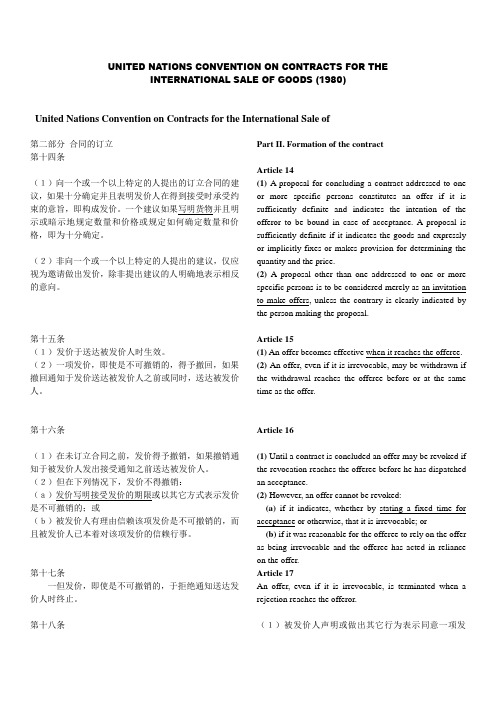
UNITED NATIONS CONVENTION ON CONTRACTS FOR THEINTERNATIONAL SALE OF GOODS (1980)United Nations Convention on Contracts for the International Sale of第二部分合同的订立Part II. Formation of the contract 第十四条(1)向一个或一个以上特定的人提出的订立合同的建议,如果十分确定并且表明发价人在得到接受时承受约束的意旨,即构成发价。
一个建议如果写明货物并且明示或暗示地规定数量和价格或规定如何确定数量和价格,即为十分确定。
(2)非向一个或一个以上特定的人提出的建议,仅应视为邀请做出发价,除非提出建议的人明确地表示相反的意向。
Article 14(1) A proposal for concluding a contract addressed to one or more specific persons constitutes an offer if it is sufficiently definite and indicates the intention of the offeror to be bound in case of acceptance. A proposal is sufficiently definite if it indicates the goods and expressly or implicitly fixes or makes provision for determining the quantity and the price.(2)A proposal other than one addressed to one or more specific persons is to be considered merely as an invitation to make offers, unless the contrary is clearly indicated by the person making the proposal.第十五条(1)发价于送达被发价人时生效。
cisg根本违约制度的概念

cisg根本违约制度的概念CISG根本违约制度的概念一、引言CISG(United Nations Convention on Contracts for the International Sale of Goods)是联合国国际贸易法委员会(UNCITRAL)于1980年通过的一项公约,旨在规范国际商品销售合同。
其中,根本违约制度是CISG中的一个重要条款。
二、根本违约的定义根本违约是指一方当事人在履行合同过程中严重违反了合同义务,导致另一方当事人无法继续履行合同或者无法实现合同目的。
这种违约被认为是严重的、不可挽回的,并对合同关系造成了不可逆转的影响。
三、根本违约制度的适用条件1. 当事人必须属于不同国家或地区;2. 合同必须涉及到商品销售;3. 适用CISG公约。
四、根本违约制度的效力当发生根本违约时,受害方有权选择解除合同并要求对方赔偿损失。
此外,如果受害方已经履行了自己在合同中规定的义务,则可以要求对方赔偿由此产生的利益损失。
五、根本违约制度的适用范围根本违约制度适用于合同中规定的所有义务,包括货物的质量、数量、包装、标记等方面。
同时,对于未在合同中规定的义务,也可以参考根本违约制度作为补充规定。
六、根本违约制度的证明当事人在主张对方存在根本违约时,需要提供充分的证据。
证据可以包括书面文件、电子邮件、口头陈述等。
如果当事人无法提供证据,则可能会影响其主张权利的实现。
七、根本违约制度与其他法律条款的关系在CISG公约中,根本违约制度与其他法律条款并列,但其地位更为重要。
如果发生了根本违约,则受害方有权选择解除合同并要求赔偿,而其他条款可能无法提供类似的救济措施。
八、结论总之,在国际商品销售合同中,CISG公约中的根本违约制度是一项非常重要的条款。
当事人应该了解其适用条件和效力,并在履行合同过程中遵守相关义务,以避免发生根本违约。
如果发生了根本违约,则受害方有权选择解除合同并要求赔偿,以保护自己的合法权益。
cisg名词解释
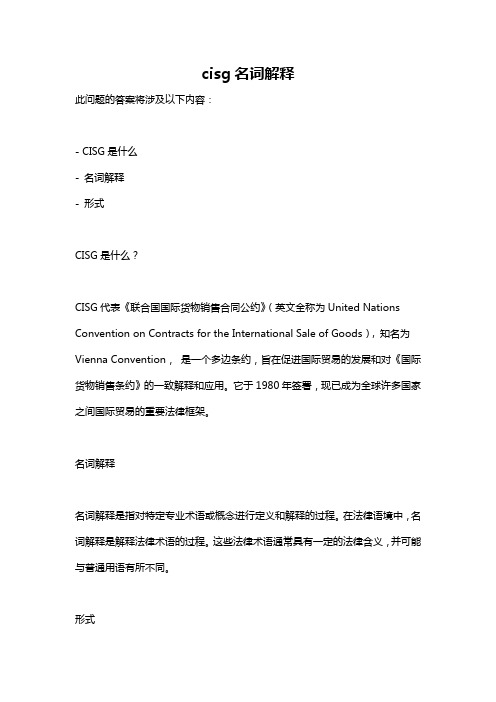
cisg名词解释
此问题的答案将涉及以下内容:
- CISG是什么
- 名词解释
- 形式
CISG是什么?
CISG代表《联合国国际货物销售合同公约》(英文全称为United Nations Convention on Contracts for the International Sale of Goods), 知名为Vienna Convention,是一个多边条约,旨在促进国际贸易的发展和对《国际货物销售条约》的一致解释和应用。
它于1980年签署,现已成为全球许多国家之间国际贸易的重要法律框架。
名词解释
名词解释是指对特定专业术语或概念进行定义和解释的过程。
在法律语境中,名词解释是解释法律术语的过程。
这些法律术语通常具有一定的法律含义,并可能与普通用语有所不同。
形式
在CISG中,名词解释通常采用的形式是对于关键术语的明确定义。
每个关键术语(如“卖方”、“买方”、“合同”、“货物”等)在公约中都有明确的定义,以便当事各方能够理解条款的确切含义和适用法律的规则。
因此,CISG中的名词解释形式是明确的定义,这些定义旨在消除由于不同国家之间法律概念的差异可能带来的错误解释。
这有助于确保在跨境贸易中达成的合同保持一致性并减少纠纷的风险。
CISG最全资料
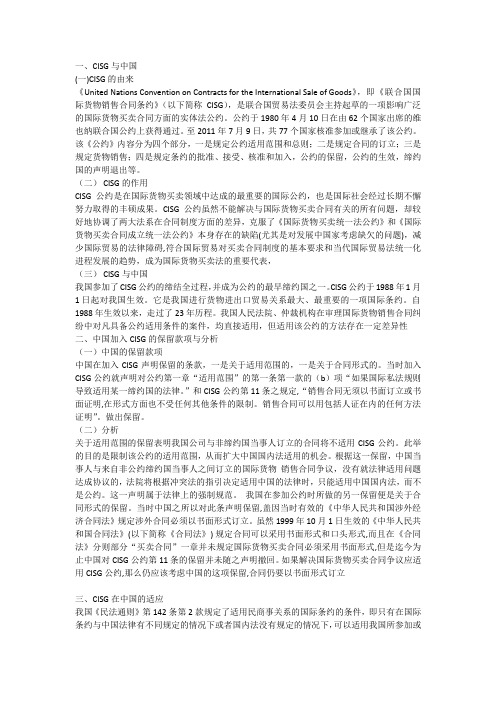
一、CISG与中国(一)CISG的由来《United Nations Convention on Contracts for the International Sale of Goods》,即《联合国国际货物销售合同条约》(以下简称CISG),是联合国贸易法委员会主持起草的一项影响广泛的国际货物买卖合同方面的实体法公约。
公约于1980年4月10日在由62个国家出席的维也纳联合国公约上获得通过。
至2011年7月9日,共77个国家核准参加或继承了该公约。
该《公约》内容分为四个部分,一是规定公约适用范围和总则;二是规定合同的订立;三是规定货物销售;四是规定条约的批准、接受、核准和加入,公约的保留,公约的生效,缔约国的声明退出等。
(二)CISG的作用CISG公约是在国际货物买卖领域中达成的最重要的国际公约,也是国际社会经过长期不懈努力取得的丰硕成果。
CISG公约虽然不能解决与国际货物买卖合同有关的所有问题,却较好地协调了两大法系在合同制度方面的差异,克服了《国际货物买卖统一法公约》和《国际货物买卖合同成立统一法公约》本身存在的缺陷(尤其是对发展中国家考虑缺欠的问题),减少国际贸易的法律障碍,符合国际贸易对买卖合同制度的基本要求和当代国际贸易法统一化进程发展的趋势,成为国际货物买卖法的重要代表,(三)CISG与中国我国参加了CISG公约的缔结全过程,并成为公约的最早缔约国之一。
CISG公约于1988年1月1日起对我国生效。
它是我国进行货物进出口贸易关系最大、最重要的一项国际条约。
自1988年生效以来,走过了23年历程。
我国人民法院、仲裁机构在审理国际货物销售合同纠纷中对凡具备公约适用条件的案件,均直接适用,但适用该公约的方法存在一定差异性二、中国加入CISG的保留款项与分析(一)中国的保留款项中国在加入CISG声明保留的条款,一是关于适用范围的,一是关于合同形式的。
当时加入CISG公约就声明对公约第一章“适用范围”的第一条第一款的(b)项“如果国际私法规则导致适用某一缔约国的法律。
商务英语写作-CISG
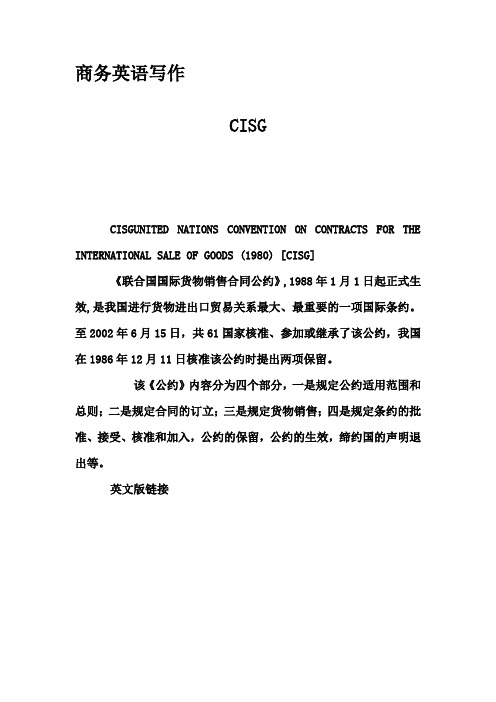
商务英语写作
CISG
CISGUNITED NATIONS CONVENTION ON CONTRACTS FOR THE INTERNATIONAL SALE OF GOODS (1980) [CISG]
《联合国国际货物销售合同公约》,1988年1月1日起正式生效,是我国进行货物进出口贸易关系最大、最重要的一项国际条约。
至2002年6月15日,共61国家核准、参加或继承了该公约,我国在1986年12月11日核准该公约时提出两项保留。
该《公约》内容分为四个部分,一是规定公约适用范围和总则;二是规定合同的订立;三是规定货物销售;四是规定条约的批准、接受、核准和加入,公约的保留,公约的生效,缔约国的声明退出等。
英文版链接。
- 1、下载文档前请自行甄别文档内容的完整性,平台不提供额外的编辑、内容补充、找答案等附加服务。
- 2、"仅部分预览"的文档,不可在线预览部分如存在完整性等问题,可反馈申请退款(可完整预览的文档不适用该条件!)。
- 3、如文档侵犯您的权益,请联系客服反馈,我们会尽快为您处理(人工客服工作时间:9:00-18:30)。
United Nations Convention on Contracts for the International Sale of Goods(1980)THE STATES PARTIES TO THIS CONVENTION,BEARING IN MIND the broad objectives in the resolutions adopted by the sixth special session of the General Assembly of the United Nations on the establishment of a New International Economic Order, CONSIDERING that the development of international trade on the basis of equality and mutual benefit is an important element in promoting friendly relations among States,BEING OF THE OPINION that the adoption of uniform rules which govern contracts for the international sale of goods and take into account the different social, economic and legal systems would contribute to the removal of legal barriers in international trade and promote the development of international trade, HAVE DECREED as follows:PART I SPHERE OF APPLICATION AND GENERAL PROVISIONSChapter I SPHERE OF APPLICATIONArticle 1(1) This Convention applies to contracts of sale of goods between parties whose places of business are in different States:(a) when the States are Contracting States; or(b) when the rules of private international law lead to the application of the law of a Contracting State.(2) The fact that the parties have their places of business in different States is to be disregarded whenever this fact does not appear either from the contract or from any dealings between, or from information disclosed by, the parties at any time before or at the conclusion of the contract.(3) Neither the nationality of the parties nor the civil or commercial character of the parties or of the contract is to be taken into consideration in determining the application of this Convention.Article 2This Convention does not apply to sales:(a) of goods bought for personal, family or household use, unless the seller, at any time before or at the conclusion of the contract, neither knew nor ought to have known that the goods were bought for any such use;(b) by auction;(c) on execution or otherwise by authority of law;(d) of stocks, shares, investment securities, negotiable instruments or money;(e) of ships, vessels, hovercraft or aircraft;(f) of electricity.Article 3(1) Contracts for the supply of goods to be manufactured or produced are to be considered sales unless the party who orders the goods undertakes to supply a substantial part of the materials necessary for such manufacture or production.(2) This Convention does not apply to contracts in which the preponderant part of the obligations of the party who furnishes the goods consists in the supply of labour or other services.Article 4This Convention governs only the formation of the contract of sale and the rights and obligations of the seller and the buyer arising from such a contract. In particular, except as otherwise expressly provided in this Convention, it is not concerned with:(a) the validity of the contract or of any of its provisions or of any usage;(b) the effect which the contract may have on the property in the goods sold.Article 5This Convention does not apply to the liability of the seller for death or personal injury caused by the goods to any person.Article 6The parties may exclude the application of this Convention or, subject to article 12, derogate from or vary the effect of any of its provisions.Chapter II GENERAL PROVISIONSArticle 7(1) In the interpretation of this Convention, regard is to be had to its international character and to the need to promote uniformity in its application and the observance of good faith in international trade.(2) Questions concerning matters governed by this Convention which are not expressly settled in it are to be settled in conformity with the general principles on which it is based or, in the absence of such principles, in conformity with the law applicable by virtue of the rules of private international law.Article 8(1) For the purposes of this Convention statements made by and other conduct of a party are to be interpreted according to his intent where the other party knew or could not have been unaware what that intent was.(2) If the preceding paragraph is not applicable, statements made by and other conduct of a party are to be interpreted according to the understanding that a reasonable person of the same kind as the other party would have had in the same circumstances.(3) In determining the intent of a party or the understanding a reasonable person would have had, due consideration is to be given to all relevant circumstances of the case including the negotiations, any practices which the parties have established between themselves, usages and any subsequent conduct of the parties.Article 9(1) The parties are bound by any usage to which they have agreed and by any practices which they haveestablished between themselves.(2) The parties are considered, unless otherwise agreed, to have impliedly made applicable to their contract or its formation a usage of which the parties knew or ought to have known and which in international trade is widely known to, and regularly observed by, parties to contracts of the type involved in the particular trade concerned.Article 10For the purposes of this Convention:(a) if a party has more than one place of business, the place of business is that which has the closest relationship to the contract and its performance, having regard to the circumstances known to or contemplated by the parties at any time before or at the conclusion of the contract;(b) if a party does not have a place of business, reference is to be made to his habitual residence. Article 11A contract of sale need not be concluded in or evidenced by writing and is not subject to any other requirement as to form. It may be proved by any means, including witnesses.Article 12Any provision of article 11, article 29 or Part II of this Convention that allows a contract of sale or its modification or termination by agreement or any offer, acceptance or other indication of intention to be made in any form other than in writing does not apply where any party has his place of business in a Contracting State which has made a declaration under article 96 of this Convention. The parties may not derogate from or vary the effect or this article.Article 13For the purposes of this Convention "writing" includes telegram and telex.PART II FORMATION OF THE CONTRACTArticle 14(1) A proposal for concluding a contract addressed to one or more specific persons constitutes an offer if it is sufficiently definite and indicates the intention of the offeror to be bound in case of acceptance. A proposal is sufficiently definite if it indicates the goods and expressly or implicitly fixes or makes provision for determining the quantity and the price.(2) A proposal other than one addressed to one or more specific persons is to be considered merely as an invitation to make offers, unless the contrary is clearly indicated by the person making the proposal. Article 15(1) An offer becomes effective when it reaches the offeree.(2) An offer, even if it is irrevocable, may be withdrawn if the withdrawal reaches the offeree before or at the same time as the offer.Article 16(1) Until a contract is concluded an offer may be revoked if the revocation reaches the offeree before he has dispatched an acceptance.(2) However, an offer cannot be revoked:(a) if it indicates, whether by stating a fixed time for acceptance or otherwise, that it is irrevocable; or(b) if it was reasonable for the offeree to rely on the offer as being irrevocable and the offeree has acted in reliance on the offer.Article 17An offer, even if it is irrevocable, is terminated when a rejection reaches the offeror.Article 18(1) A statement made by or other conduct of the offeree indicating assent to an offer is an acceptance. Silence or inactivity does not in itself amount to acceptance.(2) An acceptance of an offer becomes effective at the moment the indication of assent reaches the offeror. An acceptance is not effective if the indication of assent does not reach the offeror within the time he has fixed or, if no time is fixed, within a reasonable time, due account being taken of the circumstances of the transaction, including the rapidity of the means of communication employed by the offeror. An oral offer must be accepted immediately unless the circumstances indicate otherwise.(3) However, if, by virtue of the offer or as a result of practices which the parties have established between themselves or of usage, the offeree may indicate assent by performing an act, such as one relating to the dispatch of the goods or payment of the price, without notice to the offeror, the acceptance is effective at the moment the act is performed, provided that the act is performed within the period of time laid down in the preceding paragraph.Article 19(1) A reply to an offer which purports to be an acceptance but contains additions, limitations or other modifications is a rejection of the offer and constitutes a counter-offer.(2) However, a reply to an offer which purports to be an acceptance but contains additional or different terms which do not materially alter the terms of the offer constitutes an acceptance, unless the offeror, without undue delay, objects orally to the discrepancy or dispatches a notice to that effect. If he does not so object, the terms of the contract are the terms of the offer with the modifications contained in the acceptance.(3) Additional or different terms relating, among other things, to the price, payment, quality and quantity of the goods, place and time of delivery, extent of one partys liability to the other or the settlement of disputes are considered to alter the terms of the offer materially.Article 20(1) A period of time for acceptance fixed by the offeror in a telegram or a letter begins to run from the moment the telegram is handed in for dispatch or from the date shown on the letter or, if no such date is shown, from the date shown on the envelope. A period of time for acceptance fixed by the offeror by telephone, telex or other means of instantaneous communication, begins to run from the moment that the offer reaches the offeree.(2) Official holidays or non-business days occurring during the period for acceptance are included in calculating the period. However, if a notice of acceptance cannot be delivered at the address of theofferor on the last day of the period because that day falls on an official holiday or a non-business day at the place of business of the offeror, the period is extended until the first business day which follows. Article 21(1) A late acceptance is nevertheless effective as an acceptance if without delay the offeror orally so informs the offeree or dispatches a notice to that effect.(2) If a letter or other writing containing a late acceptance shows that it has been sent in such circumstances that if its transmission had been normal it would have reached the offeror in due time, the late acceptance is effective as an acceptance unless, without delay, the offeror orally informs the offeree that he considers his offer as having lapsed or dispatches a notice to that effect.Article 22An acceptance may be withdrawn if the withdrawal reaches the offeror before or at the same time as the acceptance would have become effective.Article 23A contract is concluded at the moment when an acceptance of an offer becomes effective in accordance with the provisions of this Convention.Article 24For the purposes of this Part of the Convention, an offer, declaration of acceptance or any other indication of intention "reaches" the addressee when it is made orally to him or delivered by any other means to him personally, to his place of business or mailing address or, if he does not have a place of business or mailing address, to his habitual residence.PART III SALE OF GOODSChapter I GENERAL PROVISIONSArticle 25A breach of contract committed by one of the parties is fundamental if it results in such detriment to the other party as substantially to deprive him of what he is entitled to expect under the contract, unless the party in breach did not foresee and a reasonable person of the same kind in the same circumstances would not have foreseen such a result.Article 26A declaration of avoidance of the contract is effective only if made by notice to the other party.Article 27Unless otherwise expressly provided in this Part of the Convention, if any notice, request or other communication is given or made by a party in accordance with this Part and by means appropriate in the circumstances, a delay or error in the transmission of the communication or its failure to arrive does not deprive that party of the right to rely on the communication.Article 28If, in accordance with the provisions of this Convention, one party is entitled to require performance of any obligation by the other party, a court is not bound to enter a judgement for specific performanceunless the court would do so under its own law in respect of similar contracts of sale not governed by this Convention.Article 29(1) A contract may be modified or terminated by the mere agreement of the parties.(2) A contract in writing which contains a provision requiring any modification or termination by agreement to be in writing may not be otherwise modified or terminated by agreement. However, a party may be precluded by his conduct from asserting such a provision to the extent that the other party has relied on that conduct.Chapter II OBLIGATIONS OF THE SELLERArticle 30The seller must deliver the goods, hand over any documents relating to them and transfer the property in the goods, as required by the contract and this Convention.Section I. Delivery of the goods and handing over of documentsArticle 31If the seller is not bound to deliver the goods at any other particular place, his obligation to deliver consists:(a) if the contract of sale involves carriage of the goods - in handing the goods over to the first carrier for transmission to the buyer;(b) if, in cases not within the preceding subparagraph, the contract relates to specific goods, or unidentified goods to be drawn from a specific stock or to be manufactured or produced, and at the time of the conclusion of the contract the parties knew that the goods were at, or were to be manufactured or produced at, a particular place - in placing the goods at the buyers disposal at that place;(c) in other cases - in placing the goods at the buyers disposal at the place where the seller had his place of business at the time of the conclusion of the contract.Article 32(1) If the seller, in accordance with the contract or this Convention, hands the goods over to a carrier and if the goods are not clearly identified to the contract by markings on the goods, by shipping documents or otherwise, the seller must give the buyer notice of the consignment specifying the goods.(2) If the seller is bound to arrange for carriage of the goods, he must make such contracts as are necessary for carriage to the place fixed by means of transportation appropriate in the circumstances and according to the usual terms for such transportation.(3) If the seller is not bound to effect insurance in respect of the carriage of the goods, he must, at the buyers request, provide him with all available information necessary to enable him to effect such insurance.Article 33The seller must deliver the goods:(a) if a date is fixed by or determinable from the contract, on that date;(b) if a period of time is fixed by or determinable from the contract, at any time within that period unless circumstances indicate that the buyer is to choose a date; or(c) in any other case, within a reasonable time after the conclusion of the contract.Article 34If the seller is bound to hand over documents relating to the goods, he must hand them over at the time and place and in the form required by the contract. If the seller has handed over documents before that time, he may, up to that time, cure any lack of conformity in the documents, if the exercise of this right does not cause the buyer unreasonable inconvenience or unreasonable expense. However, the buyer retains any right to claim damages as provided for in this Convention.Section II. Conformity of the goods and third party claimsArticle 35(1) The seller must deliver goods which are of the quantity, quality and description required by the contract and which are contained or packaged in the manner required by the contract.(2) Except where the parties have agreed otherwise, the goods do not conform with the contract unless they:(a) are fit for the purposes for which goods of the same description would ordinarily be used;(b) are fit for any particular purpose expressly or impliedly made known to the seller at the time of the conclusion of the contract, except where the circumstances show that the buyer did not rely, or that it was unreasonable for him to rely, on the sellers skill and judgement;(c) possess the qualities of goods which the seller has held out to the buyer as a sample or model;(d) are contained or packaged in the manner usual for such goods or, where there is no such manner, ina manner adequate to preserve and protect the goods.(3) The seller is not liable under subparagraphs (a) to (d) of the preceding paragraph for any lack of conformity of the goods if at the time of the conclusion of the contract the buyer knew or could not have been unaware of such lack of conformity.Article 36(1) The seller is liable in accordance with the contract and this Convention for any lack of conformity which exists at the time when the risk passes to the buyer, even though the lack of conformity becomes apparent only after that time.(2) The seller is also liable for any lack of conformity which occurs after the time indicated in the preceding paragraph and which is due to a breach of any of his obligations, including a breach of any guarantee that for a period of time the goods will remain fit for their ordinary purpose or for some particular purpose or will retain specified qualities or characteristics.Article 37If the seller has delivered goods before the date for delivery, he may, up to that date, deliver any missing part or make up any deficiency in the quantity of the goods delivered, or deliver goods in replacement ofany non-conforming goods delivered or remedy any lack of conformity in the goods delivered, provided that the exercise of this right does not cause the buyer unreasonable inconvenience or unreasonable expense. However, the buyer retains any right to claim damages as provided for in this Convention. Article 38(1) The buyer must examine the goods, or cause them to be examined, within as short a period as is practicable in the circumstances.(2) If the contract involves carriage of the goods, examination may be deferred until after the goods have arrived at their destination.(3) If the goods are redirected in transit or redispatched by the buyer without a reasonable opportunity for examination by him and at the time of the conclusion of the contract the seller knew or ought to have known of the possibility of such redirection or redispatch, examination may be deferred until after the goods have arrived at the new destination.Article 39(1) The buyer loses the right to rely on a lack of conformity of the goods if he does not give notice to the seller specifying the nature of the lack of conformity within a reasonable time after he has discovered it or ought to have discovered it.(2) In any event, the buyer loses the right to rely on a lack of conformity of the goods if he does not give the seller notice thereof at the latest within a period of two years from the date on which the goods were actually handed over to the buyer, unless this time-limit is inconsistent with a contractual period of guarantee.Article 40The seller is not entitled to rely on the provisions of articles 38 and 39 if the lack of conformity relates to facts of which he knew or could not have been unaware and which he did not disclose to the buyer. Article 41The seller must deliver goods which are free from any right or claim of a third party, unless the buyer agreed to take the goods subject to that right or claim. However, if such right or claim is based on industrial property or other intellectual property, the sellers obligation is governed by article 42.Article 42(1) The seller must deliver goods which are free from any right or claim of a third party based on industrial property or other intellectual property, of which at the time of the conclusion of the contract the seller knew or could not have been unaware, provided that the right or claim is based on industrial property or other intellectual property:(a) under the law of the State where the goods will be resold or otherwise used, if it was contemplated by the parties at the time of the conclusion of the contract that the goods would be resold or otherwise used in that State; or(b) in any other case, under the law of the State where the buyer has his place of business.(2) The obligation of the seller under the preceding paragraph does not extend to cases where:(a) at the time of the conclusion of the contract the buyer knew or could not have been unaware of theright or claim; or(b) the right or claim results from the sellers compliance with technical drawings, designs, formulae or other such specifications furnished by the buyer.Article 43(1) The buyer loses the right to rely on the provisions of article 41 or article 42 if he does not give notice to the seller specifying the nature of the right or claim of the third party within a reasonable time after he has become aware or ought to have become aware of the right or claim.(2) The seller is not entitled to rely on the provisions of the preceding paragraph if he knew of the right or claim of the third party and the nature of it.Article 44Notwithstanding the provisions of paragraph (1) of article 39 and paragraph (1) of article 43, the buyer may reduce the price in accordance with article 50 or claim damages, except for loss of profit, if he has a reasonable excuse for his failure to give the required notice.Section III. Remedies for breach of contract by the sellerArticle 45(1) If the seller fails to perform any of his obligations under the contract or this Convention, the buyer may:(a) exercise the rights provided in articles 46 to 52;(b) claim damages as provided in articles 74 to 77.(2) The buyer is not deprived of any right he may have to claim damages by exercising his right to other remedies.(3) No period of grace may be granted to the seller by a court or arbitral tribunal when the buyer resorts toa remedy for breach of contract.Article 46(1) The buyer may require performance by the seller of his obligations unless the buyer has resorted to a remedy which is inconsistent with this requirement.(2) If the goods do not conform with the contract, the buyer may require delivery of substitute goods only if the lack of conformity constitutes a fundamental breach of contract and a request for substitute goods is made either in conjunction with notice given under article 39 or within a reasonable time thereafter. (3) If the goods do not conform with the contract, the buyer may require the seller to remedy the lack of conformity by repair, unless this is unreasonable having regard to all the circumstances. A request for repair must be made either in conjunction with notice given under article 39 or within a reasonable time thereafter.Article 47(1) The buyer may fix an additional period of time of reasonable length for performance by the seller of his obligations.(2) Unless the buyer has received notice from the seller that he will not perform within the period so fixed, the buyer may not, during that period, resort to any remedy for breach of contract. However, the buyer isnot deprived thereby of any right he may have to claim damages for delay in performance.Article 48(1) Subject to article 49, the seller may, even after the date for delivery, remedy at his own expense any failure to perform his obligations, if he can do so without unreasonable delay and without causing the buyer unreasonable inconvenience or uncertainty of reimbursement by the seller of expenses advanced by the buyer. However, the buyer retains any right to claim damages as provided for in this Convention.(2) If the seller requests the buyer to make known whether he will accept performance and the buyer does not comply with the request within a reasonable time, the seller may perform within the time indicated in his request. The buyer may not, during that period of time, resort to any remedy which is inconsistent with performance by the seller.(3) A notice by the seller that he will perform within a specified period of time is assumed to include a request, under the preceding paragraph, that the buyer make known his decision.(4) A request or notice by the seller under paragraph (2) or (3) of this article is not effective unless received by the buyer.Article 49(1) The buyer may declare the contract avoided:(a) if the failure by the seller to perform any of his obligations under the contract or this Convention amounts to a fundamental breach of contract; or(b) in case of non-delivery, if the seller does not deliver the goods within the additional period of time fixed by the buyer in accordance with paragraph (1) of article 47 or declares that he will not deliver within the period so fixed.(2) However, in cases where the seller has delivered the goods, the buyer loses the right to declare the contract avoided unless he does so:(a) in respect of late delivery, within a reasonable time after he has become aware that delivery has been made;(b) in respect of any breach other than late delivery, within a reasonable time:(i) after he knew or ought to have known of the breach;(ii) after the expiration of any additional period of time fixed by the buyer in accordance with paragraph (1) of article 47, or after the seller has declared that he will not perform his obligations within such an additional period; or(iii) after the expiration of any additional period of time indicated by the seller in accordance with paragraph (2) of article 48, or after the buyer has declared that he will not accept performance.Article 50If the goods do not conform with the contract and whether or not the price has already been paid, the buyer may reduce the price in the same proportion as the value that the goods actually delivered had at the time of the delivery bears to the value that conforming goods would have had at that time. However, ifthe seller remedies any failure to perform his obligations in accordance with article 37 or article 48 or if the buyer refuses to accept performance by the seller in accordance with those articles, the buyer may not reduce the price.Article 51(1) If the seller delivers only a part of the goods or if only a part of the goods delivered is in conformity with the contract, articles 46 to 50 apply in respect of the part which is missing or which does not conform.(2) The buyer may declare the contract avoided in its entirety only if the failure to make delivery completely or in conformity with the contract amounts to a fundamental breach of the contract.Article 52(1) If the seller delivers the goods before the date fixed, the buyer may take delivery or refuse to take delivery.(2) If the seller delivers a quantity of goods greater than that provided for in the contract, the buyer may take delivery or refuse to take delivery of the excess quantity. If the buyer takes delivery of all or part of the excess quantity, he must pay for it at the contract rate.Chapter III OBLIGATIONS OF THE BUYERArticle 53The buyer must pay the price for the goods and take delivery of them as required by the contract and this Convention.Section I. Payment of the priceArticle 54The buyers obligation to pay the price includes taking such steps and complying with such formalities as may be required under the contract or any laws and regulations to enable payment to be made.Article 55Where a contract has been validly concluded but does not expressly or implicitly fix or make provision for determining the price, the parties are considered, in the absence of any indication to the contrary, to have impliedly made reference to the price generally charged at the time of the conclusion of the contract for such goods sold under comparable circumstances in the trade concerned.Article 56If the price is fixed according to the weight of the goods, in case of doubt it is to be determined by the net weight.Article 57(1) If the buyer is not bound to pay the price at any other particular place, he must pay it to the seller:(a) at the sellers place of business; or(b) if the payment is to be made against the handing over of the goods or of documents, at the place where the handing over takes place.(2) The seller must bear any increases in the expenses incidental to payment which is caused by a change in his place of business subsequent to the conclusion of the contract.。
